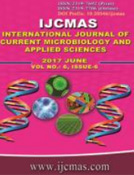


 National Academy of Agricultural Sciences (NAAS)
National Academy of Agricultural Sciences (NAAS)

|
PRINT ISSN : 2319-7692
Online ISSN : 2319-7706 Issues : 12 per year Publisher : Excellent Publishers Email : editorijcmas@gmail.com / submit@ijcmas.com Editor-in-chief: Dr.M.Prakash Index Copernicus ICV 2018: 95.39 NAAS RATING 2020: 5.38 |
The presence of chromosome heteromorphisms in the karyotypes of two patient groups was compared. The first group of patients consisted of 138 infertile couples and the second group of patients were fetuses whose amniotic fluid samples were obtained during the same period (n = 1130). In the infertile group, 18 individuals (11 males and seven females; 6.52%) were found to have different kinds of chromosome heteromorphisms. In females, the frequency of heteromorphisms was 5% and in males 7.9%. Eleven males who had heteromorphisms were oligozoospermic or azoospermic. The seven women with chromosome heteromorphisms had normospermic partners. Among 1,130 amniocentesis samples studied female karyotype in 543 and male karyotype in 587 fetuses were investigated. It was observed that the polymorphism was detected in nine (1.65%) female and 11 (1.87%) male fetuses. The parents of these fetuses were also karyotyped and all heteromorphisms were found to be inherited from either one of the parents. The association of chromosomal polymorphic variations with recurrent miscarriage was also studied.The results indicated that the recurrent miscarriage becomes a problem that affect an increasing number of couples with the frequency of about 1% in the couples who want to conceive. This study is based on comparison of chromosome Heteromorphism in the karyotypes of two groups. The first group was of 400 individuals with the history of more than two miscarriages and no live birth and as control group 200 individuals with one or more than one normal child. The study revealed that the frequency of chromosomal abnormalities and variations leading to recurrent miscarriage in couples was 18% Chromosomal rearrangements constituted 27.78% of the cases while heterochromatic variations constituted 72.22% of the chromosomal cause for recurrent miscarriages. In the present study, pericentric inversion of chromosome 9 and heteromorphism of chromosomes 1 were the most common findings. Present study indicates that there is need to evaluate the known heterochromatic variants as these variants play an important role in pregnancy loss.
 |
 |
 |
 |
 |